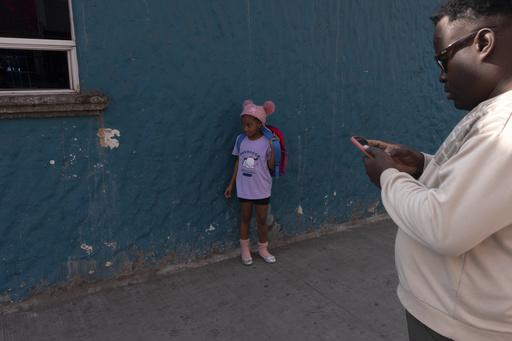
TIJUANA, Mexico — Margelis Rodriguez and her two children recently marked a significant moment in their journey with a flight to Tijuana, capturing the experience with selfies showcasing custom T-shirts they had created for what they hoped would be a transformative chapter in their lives.
The shirts featured their names and the flags of the six countries they traversed, with an uplifting message in Spanish on the front stating: “Yes it was possible, thank God. The wait was worth it. I made it!!” However, the celebratory tone now serves as a painful reminder of how close they came to achieving their dreams and the precariousness of their current situation, which has left their future shrouded in uncertainty. Rodriguez shared her feelings while standing by the tent her family now occupies at a shelter in Tijuana, located just a block from the imposing wall that demarcates the U.S. border.
Rodriguez’s family is among the many who have been caught in the web of immigration policy changes, with tens of thousands still awaiting appointments as of February. Many found themselves stranded in various Mexican border towns following the abrupt cancellation of appointment systems that had been put in place under the previous administration. Since the Biden administration took office, the CBP One app has facilitated nearly one million entries, aiming to bring more structure to border crossings while simultaneously reducing illegal migration attempts.
According to U.S. Customs and Border Protection, approximately 280,000 people seek appointments daily, with most having traveled to Mexico — the sole country where the app operates. Many now face the unsettling dilemma of their next steps. Some have returned home, while others have resolved to take their chances by attempting to cross the border illegally. The Rodriquez family illustrates the prevailing uncertainty, opting to wait and see how the evolving immigration landscape unfolds in the coming months.
Rodriguez and her children boarded their Tijuana flight on January 19, just before Trump’s inauguration. She initially believed the change in administration would not impact their scheduled appointment on January 21. Rodriguez had hopes of starting a new life — her friend in Chicago had offered her a job in a factory, accommodation, and schooling for her children.
However, when she received the notification canceling their appointment, she felt as if she had been struck. Despite the setback, they arrived at the port of entry early, only to wait for seven hours without being called. Over a year has passed since they left Tumeremo, a hometown riddled with gang violence and criminal activity linked to illegal gold mining located near the borders of Guyana and Brazil. Rodriguez explained that organized crime had increasingly affected daily life, often shutting down her children’s school and causing fear throughout the community.
Joined by her friend and the friend’s 16-year-old son, they traveled for two and a half days through the treacherous Darién Gap before spending nine months in Pachuca, on the outskirts of Mexico City. During this time, Rodriguez juggled various jobs, including work at a tortilla shop and in caretaking, as she prepared for their appointment.
Now in Tijuana, nearly all her earnings have gone toward their journey, leaving her unable to afford the $1,200 required to return to Pachuca. Each day passes with a mix of boredom and anxiety, as she and her children participate in daily chores at the shelter, which include cleaning bathrooms and cooking meals. Her son, Mickel, who aspires to play soccer professionally and dreams of buying a house for his mother, has lamented the lack of children his age at the shelter to socialize with.
At night, they sleep together in a small tent surrounded by others, all beneath a large banner bearing the words, “This is about humanity.” Rodriguez has found it challenging to rest, burdened by worry. She is unwilling to put her children in danger by attempting illegal entry into the U.S. and remains distressed by worsening conditions back home. With friends and family who have entered the U.S. under the Biden administration fearing deportation, Rodriguez feels trapped in a hopeless situation.
Despite her worries for safety in Tijuana, she is in the process of applying for a Mexican visa to enable her to work locally. She intends to start searching for apartments and enroll her children in nearby schools.
Recently, she and her children, along with a few other migrants, made their way to a laundromat, pushing a stroller loaded with dirty clothes, including the T-shirts that had once held so much hope. A local pastor has provided some comfort, telling her that they are in a favorable position, especially compared to the circumstances facing migrants in the U.S.
Her relatives have reassured her that conditions may improve in a few months, speculating that the U.S. is simply “cleaning out” immigrants with criminal records and that there might soon be new legal pathways to enter the country under the new administration. Reflecting on her ongoing plight, Rodriguez expressed a mix of feelings: “We have been left stranded, stuck in limbo. Of course, at times I still despair, but I also hold onto a glimmer of hope. We just have to restart, once again.”

